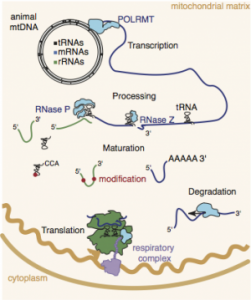CURRENT RESEARCH PROJECTS
Project
Mitochondrial RNA-binding proteins and their role in mitochondrial gene expression.
Project
Mitochondrial RNA-binding proteins and their role in mitochondrial gene expression.
Project Outline

Fig 1. Mitochondrial mRNAs are transcribed as part of long primary transcripts that generally encompass the entire mtDNA, therefore the ratios of the 11 mammalian mitochondrial mRNAs and their proteins are controlled post-transcriptionally. Little is known about how these 11 mRNAs are regulated in mammalian mitochondria. This is particularly important since tissue-, cell- and disease-specific variations in expression of mitochondrial RNAs has been observed, but cannot be explained at present. The basic components and mechanisms of transcription have recently been discovered, however the control of mRNA processing, translation and stability remains unclear.
We are interested in identifying mammalian mitochondrial RNA-binding proteins and investigating their role in RNA metabolism in cells. Discovery of proteins and the RNAs they bind may shed light on the regulation of gene expression in mammalian mitochondria. In addition, we are developing new methods for the identification of mitochondrial RNAs bound by the mitochondrial RNA-binding proteins that may regulate their expression in health and in disease.
Identification of mutations that cause mitochondrial disease
Mitochondrial diseases are progressive and debilitating multi-system disorders that occur as a result of mutations in nuclear or mitochondrial genes with no known cures to date. The clinical heterogeneity in mitochondrial disorders is complemented by genetic heterogeneity, where mutations in mitochondrial or nuclear genes cause similar phenotypes thus complicating mutation identification. We use next generation technologies to identify mutations in DNA from patients that suffer from mitochondrial diseases to identify the mutations that cause these diseases. We use patient cells to investigate how mutations in mitochondrial genes cause the molecular changes that cause mitochondrial and cellular dysfunction that leads to the disease pathology.
CURRENT STUDENT PROJECTS
Student Project
Identifying the genetic causes of mitochondrial diseases
Student Project
Identifying the genetic causes of mitochondrial diseases
Project Outline
This project involves the use of a range of techniques in genetics, cell biology (such as cell culture, cell death assays, fluorescence microscopy, gel electrophoresis, western blotting), genomics (exome sequencing), molecular biology (cloning, quantitative PCR, RNA interference) and biochemistry (protein purification, enzyme activity measurements).
Contact
Professor Aleksandra Filipovska – [email protected]
Chief supervisor
Professor Aleksandra Filipovska
Other supervisor
Dr Tara Richman and Professor Luba Kalaydjieva
Project suitable for
Honours, Masters and PhD
Essential qualifications
BSc or BSc (Hons)
Student Project
Characterising the pathology of mitochondrial diseases
Student Project
Characterising the pathology of mitochondrial diseases
Project Outline
Contact
Professor Aleksandra Filipovska – [email protected]
Chief supervisor
Professor Aleksandra Filipovska
Other supervisor
Dr Tara Richman
Project suitable for
Honours, Masters and PhD
Essential qualifications
BSc or BSc (Hons)
Start date
anytime
Student Project
Characterising the pathology of mitochondrial diseases
Student Project
Characterising the pathology of mitochondrial diseases
Project Outline
This project involves the use of a range of techniques in genetics, mouse pathology and physiology, cell biology (such as cell culture, cell death assays, fluorescence microscopy, gel electrophoresis, western blotting), molecular biology (cloning, quantitative PCR, RNA interference) and biochemistry (protein purification, enzyme activity measurements).
Contact
Professor Aleksandra Filipovska – [email protected]
Chief supervisor
Professor Aleksandra Filipovska
Other supervisor
Dr Tara Richman
Project suitable for
Honours, Masters and PhD
Essential qualifications
BSc or BSc (Hons)
Start date
anytime
